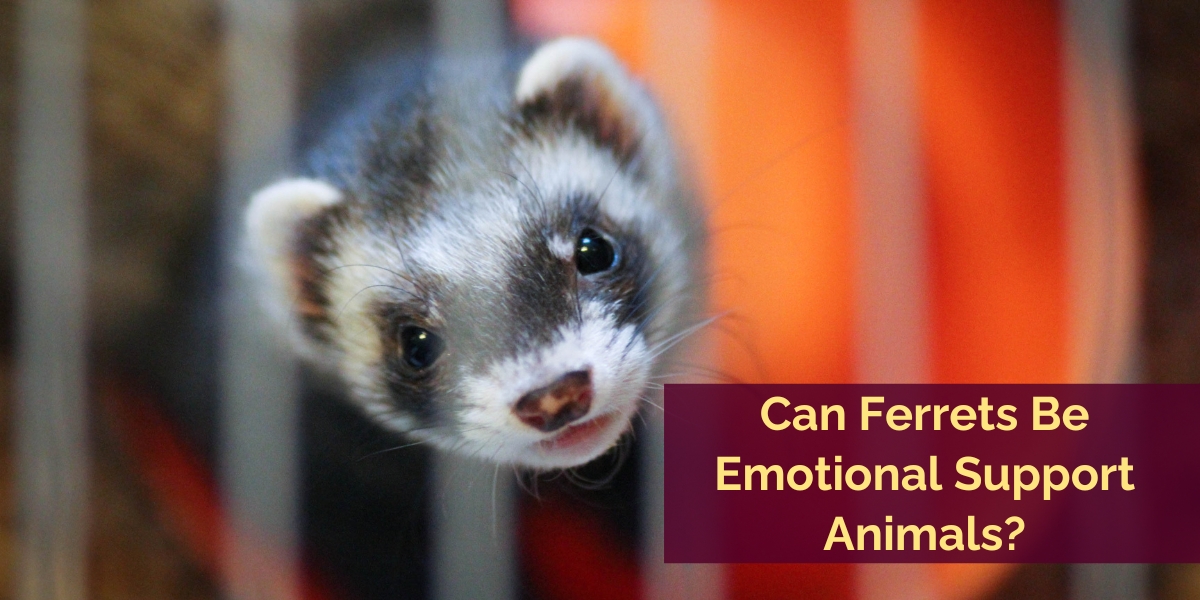When we think about emotional support animals (ESA), the usual suspects that come to mind are dogs or cats. But did you know that ferrets, with their playful antics and affectionate nature, are climbing up the popularity ladder as potential ESAs? The question at the heart of this discussion is: Can ferrets be emotional support animals? Let’s dig in and find out!
What Makes an Emotional Support Animal?
Before diving into ferrets specifically, let’s outline what truly defines an ESA. An emotional support animal (ESA) is not just any pet. ESAs are companion animals that provide comfort and companionship to individuals with a disability. They aren’t necessarily trained for specific tasks, unlike service animals. Instead, they exist primarily to offer emotional support (hence the name!) to those suffering from conditions like depression, anxiety, or panic attacks.
Now, imagine having a rough day and coming home to a playful, energetic ferret who’s eager to engage with you. Would that not lift your spirits?
Ferrets as ESAs
Ferrets, being the curious and friendly creatures they are, can bond closely with their owners. Their playful nature can serve as a distraction, especially for those who struggle with conditions like depression and anxiety. However, they do have short attention spans, which means they can be unpredictable at times. But isn’t that part of their charm?
Pros:
- Comfort and Companionship: Ferrets, being social creatures, offer comfort and companionship.
- Distraction from Anxiety: Their lively antics can divert an individual’s attention from a brewing panic attack or a bout of depression.
- Bonding: These creatures bond closely with their owners, forming a connection that’s hard to break.
Cons:
- Short Attention Spans: Their unpredictability might not be suitable for everyone.
- Maintenance: Ferrets require specific care, which can be a challenge for some.
Legal Aspects in the United States
Now, you might be wondering about the legal implications of having ferrets as ESAs, especially in the United States. Americans with Disabilities Act (ADA), or specifically the disabilities act ADA, doesn’t specify types of animals that can be ESAs. However, the act does mention that an ESA should not cause undue hardship or disturbances. While ferrets are generally peaceful, their playful nature could potentially cause disruptions.
To have a ferret or any other animal recognized as an ESA, you need an ESA letter. This letter is a recommendation from a licensed professional stating the animal provides essential emotional support to an individual with a disability. Remember, while therapy animals and psychiatric service animals undergo specific training, ESAs, like ferrets, do not.
The Difference Between Service Animals and ESAs
It’s essential to understand the difference between service animals and emotional support animals. In accordance with the Americans with Disabilities Act, they perform specific tasks for individuals with a disability. For instance, a dog might be trained for animal assisted therapy or to guide someone with visual impairments. In contrast, an ESA offers emotional support without necessarily being trained for specific tasks.
Can ferrets be classified as emotional support animals?
While dogs and cats are the usual ESA choices, there’s no rule against ferrets being emotional support animals. Due to their ability to bond closely with their owners, they make them prime candidates. However, as with any animal, it’s about the bond and support they offer the individual, not just their species.
Do you think your ferret provides you with the necessary emotional support? Are they your pillar of strength during tough times? If yes, then, with the backing of a licensed mental health professional, your ferret might just qualify to being emotional support animals!
Conclusion
While ferrets might be unconventional choices for emotional support animals, they hold a world of potential. Their playful nature, coupled with their ability to bond closely with their owners, places them right up there with other types of animals traditionally chosen as ESAs. So, the next time you see a ferret, maybe you’ll see them in a different, more supportive light. Who knows? They might just be the emotional anchor someone needs in their life.
Isn’t it heartwarming to think that even the smallest of creatures can make the most significant impact on our emotional well-being?
FAQs
Service animals are specifically trained to perform tasks that assist individuals with a disability, such as guiding the visually impaired or detecting seizures. On the other hand, ESAs, like ferrets, offer emotional comfort and do not necessarily need specialized training.
No, ferrets do not require specific training to become ESAs. Their role is to provide emotional support and comfort. However, it’s beneficial if they are well-behaved and can interact positively with their owners and others.
Yes, to have a ferret recognized as an emotional support animal, you’d typically need an ESA letter. This is a recommendation from a licensed mental health professional that highlights the essential emotional support the ferret offers to the individual.
While the Americans with Disabilities Act (ADA) does provide provisions for ESAs, individual establishments or housing units might have their own policies. It’s always advisable to check with the specific place beforehand.
Ferrets, with their playful and curious nature, can distract individuals from stressors, anxiety, or depressive thoughts. Their ability to bond closely with their owners also helps in forming a comforting and supportive relationship, akin to the support dogs or cats offer.

